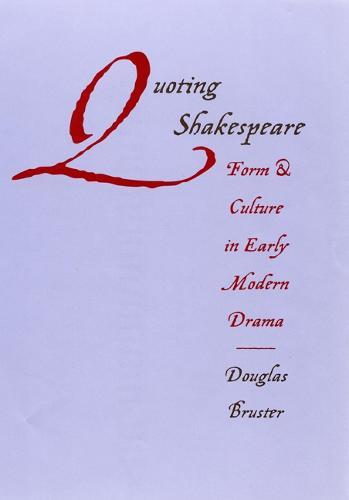Full Product Details
Author: Douglas Bruster
Publisher: University of Nebraska Press
Imprint: University of Nebraska Press
Dimensions:
Width: 15.20cm
, Height: 1.90cm
, Length: 22.90cm
Weight: 0.567kg
ISBN: 9780803213036
ISBN 10: 0803213034
Pages: 277
Publication Date: 01 December 2000
Audience:
Professional and scholarly
,
Professional & Vocational
Format: Hardback
Publisher's Status: Active
Availability: Out of stock

The supplier is temporarily out of stock of this item. It will be ordered for you on backorder and shipped when it becomes available.
Reviews
"""Bruster presents a timely and original analysis. Quoting Shakespeare makes an important and badly needed contribution to the field of early modern studies. His approach to the way we write cultural history represents a salutary alternative to the critique of domination that characterises much recent work.""--Michael D. Bristol, author of Big-Time Shakespeare. ""Bruster vividly demonstrates how Shakespeare, more inventively than other authors, borrows and transforms. Bruster's approach illuminates some ways in which reading a text inter-textually illuminates the author's relation to cultural, historical, and political contexts. The book helps us to understand the intensively composite nature of Shakespearean and other early modern texts, both dramatic and non-dramatic. In doing so, it also provides a methodological coherence by drawing on feminist, cultural materialist, and 'new' historicist criticism.""--David Bevington, editor of The Politics of the Stuart Court Masque"
Bruster presents a timely and original analysis. Quoting Shakespeare makes an important and badly needed contribution to the field of early modern studies. His approach to the way we write cultural history represents a salutary alternative to the critique of domination that characterises much recent work. --Michael D. Bristol, author of Big-Time Shakespeare. Bruster vividly demonstrates how Shakespeare, more inventively than other authors, borrows and transforms. Bruster's approach illuminates some ways in which reading a text inter-textually illuminates the author's relation to cultural, historical, and political contexts. The book helps us to understand the intensively composite nature of Shakespearean and other early modern texts, both dramatic and non-dramatic. In doing so, it also provides a methodological coherence by drawing on feminist, cultural materialist, and 'new' historicist criticism. --David Bevington, editor of The Politics of the Stuart Court Masque
""Bruster presents a timely and original analysis. Quoting Shakespeare makes an important and badly needed contribution to the field of early modern studies. His approach to the way we write cultural history represents a salutary alternative to the critique of domination that characterises much recent work.""--Michael D. Bristol, author of Big-Time Shakespeare. ""Bruster vividly demonstrates how Shakespeare, more inventively than other authors, borrows and transforms. Bruster's approach illuminates some ways in which reading a text inter-textually illuminates the author's relation to cultural, historical, and political contexts. The book helps us to understand the intensively composite nature of Shakespearean and other early modern texts, both dramatic and non-dramatic. In doing so, it also provides a methodological coherence by drawing on feminist, cultural materialist, and 'new' historicist criticism.""--David Bevington, editor of The Politics of the Stuart Court Masque
Author Information
Douglas Bruster is an assistant professor of English at the University of Texas at Austin and the author of Drama and the Market in the Age of Shakespeare.



